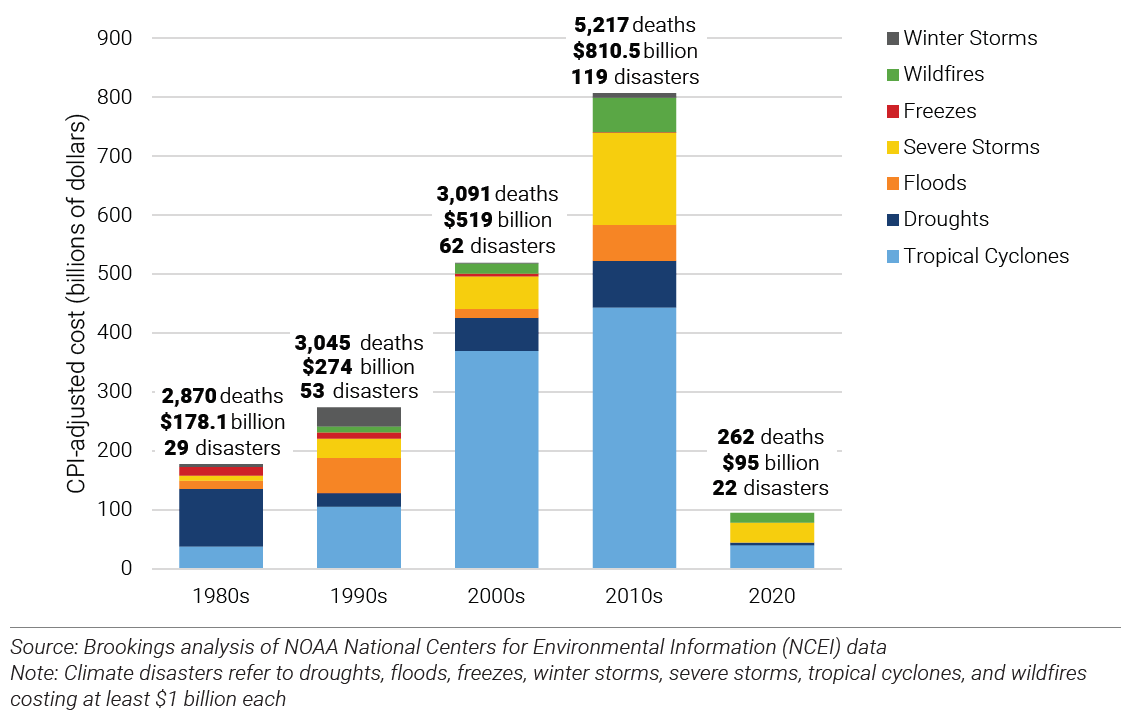ctrl-fs "reinsurance", finds nothing I used to follow Noah Smith. He's occasionally insightful but mostly he goes "I understand this one corner of the world a little, let me extend my generalizations to the rest of the universe in a confident and conversational tone to make you think I've actually thought this through." The answer to this one is dumbly simple: because historically the environment has been an externality in economic calculations and if you're going to attempt to include that externality you need to assign a monetary value to it. Which means everyone is going to fight over it. And since economists are clueless twits that pull a hammie with any math stronger than algebra, they just avoid it. Here's the dumb thing, though: the big reinsurance firms have been quietly, calmly including global warming calcs in their rate books since 2008 or so. They've had no choice: it's their job. When Allstate takes it in the nuts on a flood they aren't spending their own money, they're spending money from their policy which is with Zurich Re or Allianz Re or Munich Re or any of the other big firms that insure insurers. And when Zurich Re or Allianz Re or Munich Re have been steadily increasing their prices for coastal cities for more than a decade, the math is there. The numbers are there. But since they aren't in the shape of "what's the inherent value of a living tree" the guys who give out prizes for 'CAPE ratio' go off and argue that real estate prices declining is a six sigma event. Here's something I see more and more of: the economic and environmental impact of FEMA flood maps. IF: - Flood insurance is available to every habitable domicile by constitutional mandate AND - The only way to assess flood risk is through measurement THEN - Every time a new FEMA flood map comes out, "habitable" changes for the area mapped. I don't have enough fingers and toes to count the properties I've followed that should be worth millions but are worth thousands because when they were built? They were charming houses on a creek but after FEMA came through in 2012? They're on the 100-year floodplain, are red-tagged, and cannot get so much as a roofing permit because state and federal governments ain't gonna pay to rescue you. The local creek, 50 yards down the road? Has breached the 100-year floodplain every year since 2014. Tells ya that FEMA was a little optimistic as it is. It wouldn't take an economist much to scrape appraised property values of every parcel before and after a FEMA remap. Shit, I'll bet you could do it. But you don't fear algebra.
Everyone I know who is buying a house these days is already considering flooding and future water level risks. They're moving away from the beachfront property, not towards it. I know I'll be researching fresh water resources and other existential risks as well before committing to a 30 year mortgage somewhere.
Well now I'm looking at the National Risk Index which is kind of fun when you look at WA because the risk of almost everything in Western WA is "relatively low" or "very low" but then you look at low probability, high consequence events such as Volcanic Activity and Earthquakes and now you are looking at some of the highest risk indices and estimated annual losses in the country. Guess it's time to move to upper New England or Wyoming if you want to live in an overall low risk area, cause the rest of the country looks fairly yellow to red.
Right- but now you're talking a different kind of economics. When the Nisqually quake hit, Puget Sound became a disaster area, Federal money flowed in and everyone rebuilt-ish eventually. The only outfit I know that got profoundly fucked was the club I was mixing at because, irony of ironies, we were in the midst of an earthquake retrofit for the week-and-a-half overlapping Feb 28 2001 so that building got fukt. But by and large? "X% of damage over Y% of area related to Z fault happens every W years" is doable. "X volcano erupting every Y decades doing Z damage" is less doable but still largely doable. And what do you get for your risk? People didn't settle Pompeii because they wanted to live dangerously, they settled Pompeii because recently-volcanic soil raised rippin' wine grapes. Still does. That there's a pretty new tool, by the way. I hadn't seen it before. It's probably worth a post of its own. Hint hint.
